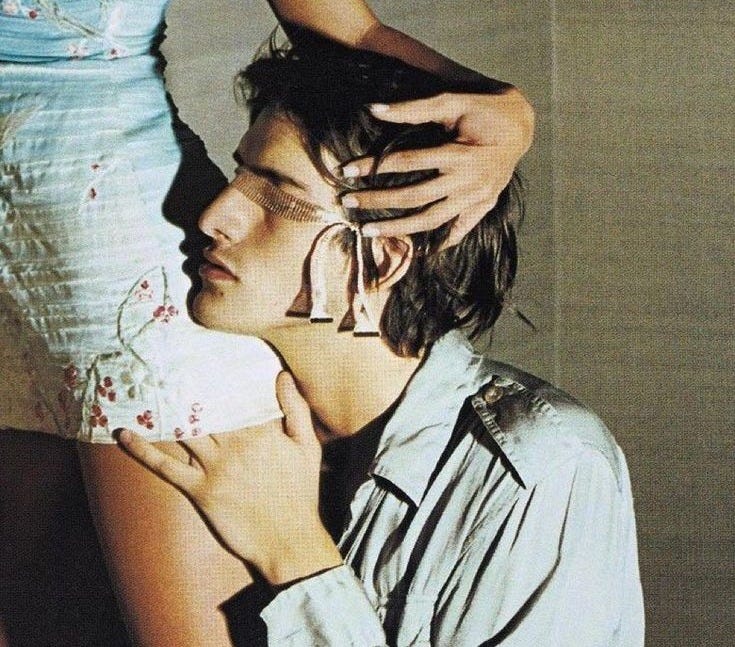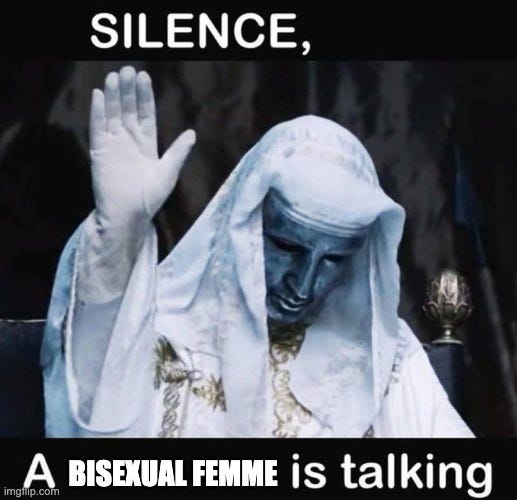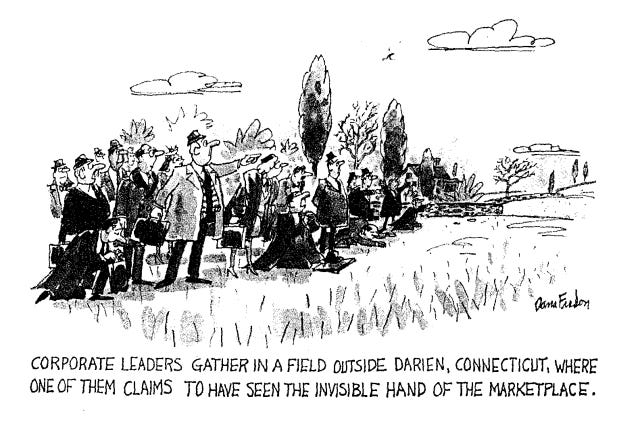Biphobia is a Recession Indicator
publishing's fear of sexual fluidity and the myth of "market-friendly" romance
In many ways, it’s never been a better time to be a queer author of queer love stories. Access to self-publishing technology is at an all-time-high and so is access to readers via social media. The success of many traditionally published queer books over the last decade has paved the way for new queer authors.
On the flip side, it’s a pretty bad time be a queer author at a systemic level, as publishers tighten their belts and choose to acquire more mainstream (in some cases, already wildly successful) books, and as book banning and digital censorship laws become more Draconian in an increasingly reactionary, data-starved, broke United States. As so often is the case during these pinch points in history, all art becomes suspect, and queer art, from erotica to children’s literature, struggles to keep its head above the rising accusations of depravity, “bad rep”, decadence, grooming, and “cultural Marxism”.
I’m not going to pretend to be an economist or a political scientist, but I know a race to the bottom when I see once, and I know how people lash out at cultural boogeyman when they start to get the sinking feeling that every bubble they’ve invested in is about to burst. We’re all scared about an uncertain future, we’re all screen-sick and alienated from each other, and we’re all in increasingly deep debt to everyone from Sally Mae to Klarna to the ER. Most of all, we’re all desperate for some kind of center that will hold, the promise of a happy ending tied up with a nice socially cohesive bow, even if it’s just a fantasy.
Did I mention this essay is about romance novels? It’s always about romance novels, ust the same way it’s always about God, in some shape or another. What we desire, the fervent faith we hold deep in the secret chambers of our heart, will always tell the truth about our culture more than statistics ever will.
Romance novels are about desire in the libidinous sense, the search for carnal transcendence through a breathless and chaste dance at a Victorian ball or a flogging scene at a kink club that makes the protagonist see God, but it’s also about our desire for connection. Specifically, for belonging, a happy ending stretching into a future where we know who we are to others, what our role in society is, and how we can expect to be taken care of.
We are what we love, after all. And we can only love as widely as the ultimate happiness we can imagine for ourselves and for other people.
This bisexual author of bisexual fiction would like to posit: is that happiness expansive enough to make space for sexual fluidity?
Do we have the depth of emotional acuity and will of mind to imagine a world where someone who is neither gay or straight is also a part of that community’s tapestry of happy endings? Or are we too fearfully protective of the binaries we believe will protect us when the chips are down?
FAR BE IT FROM ME to be one of those femme bisexual cis women who center themselves in queer discourse by perpetually wringing their hands about whether they are “queer enough”. Instead, I am to offer just one perspective on a real cultural shift, read through the lens of the industry in which I specialize. The only experience I have is my own.
I write messy bisexual love stories - sometimes sweet, sometimes toxic, sometimes involving more than two people, but always with an HEA. If you’d like to hear more about them, and more about my takes on arts and culture, desire and spirituality, and the publishing industry, don’t forget to subscribe.
So now, with further ado, let’s start a couple fights.
Who’s Afraid of the Invisible Hand of the Market?
Bring up concerns about homophobia, biphobia, or transphobia in romance spaces (let alone racial bias, but that is another essay better suited to anther writer), and people will remind you that they don’t make the rules, The Market does. What even are the confluence of assumed-to-be-unchangeable factors we call The Market?
The conventional wisdom is: Because romance is only read by straight women (not true) and written by straight women (not true1), the market must appeal to the tastes of an average straight woman (how we’re charting longing onto a bell curve, I’ve got no clue). Reading romance is a self-insert fantasizing exercise first and foremost. Therefore, the most successful romances are love stories between one man and one woman, so the female reader can easily imagine herself as the heroine (rip to all the romance heroes I’ve felt deep kinship with, Auden Guest you will always be famous). After that the biggest share of the market is held by m/m romances between two cis men written with an eye towards female “appreciation” (I can’t even get into this without biting something let’s move on), with the smallest market share held by f/f romances, which are assumed to be read by sapphics and no one else. Romances between more than two people are tossed into the catch-all bucket of BSDM/erotica/fetish/ romance regardless of heat level, romances featuring trans characters can sometimes escape relegation to the naughty bucket if they are mass-market appealing in every other way, and bisexual romances…Well, what’s a bisexual romance anyway? Do you mean they’re having sex with men and women in the same book? You’ve got the naughty bucket for that. No, it’s monogamous? Well, just sort it by if the final coupling looks straight or gay. Oh, the protagonist is nonbinary? Uh……Girl nonbinary or boy nonbinary?
Each piece in this hegemonic framework is backed up by some data, but not all the data2. Such a set and unchanging market framework relies on shared assumptions about how gender, sexual plasticity, and fiction work, and experiences the same pitfalls as high-level classical invisible hand market theory. It does not account for markets being subject to speculation, bubbles, and monopolies, or tampering, and its not as concerned as I would like about the ways some people have more power to influence the market than others. “Algorithm” didn’t mean the same thing to Adam Smith as it does to us, and while he did have to deal with kings, he wasn’t dealing with tech tyrants who controlled every step of production, the goods produced, and the biometric and personal data of those producing and buying those goods.
As always, the marketplace of art remains more complicated than any of us are comfortable with. And that discomfort with nonduality rears its head when we talk about how to sell a romance with a bisexual protagonist.
I Came Out To Have a Good Time and I Am Feeling So Attacked Right Now
People have gotten how, shall we say, real fuckin weird about bisexual romance lately. There was plenty of mild “not for me” disinterest when I first started publishing five years ago, but the amount of open pushback from readers has spiked during the second Trump administration. Everything from readers cancelling preorders when they realize that the two men in the book are involved with each other and not just women, cons attendees just walking away from my table when they realize my characters are bi, and the uphill battled I’ve had promoting my newest book a gothic romance between two men and two women, as queer, yes, but neither straight nor gay because, well. All the characters are bisexual.
Writing sexy queer love stories for a living is definitionally a cushy job, but folks are bringing a certain hostility to the workplace that is setting off my socio-political alarm bells.
I reached out to other authors of bisexual romance on Threads to take the temperature on increasing biphobia. They shared everything from a book being excluded from both queer and straight romance promotions, readers saying bi characters who end up in opposite-sex relationships are “not actually queer”, receiving genuine hate mail when a bi character didn’t end up with the gender the audience thought was “right”, and reviewers labelling bi men as “gay” regardless of context and claiming that gay romances are “spicier” because gay men are just more…sexual I guess? This doesn’t even touch how often bi authors get grilled about their sexual history or real-life marriages so people can decide if they are “actually queer” or just “faking it for woke points".
People behave badly the internet all the time, but why this is this particular batch of brainworms so dangerous, and what sort of grounding does book discourse have in politics? Well…You’re not gonna love the answer.
Keep reading with a 7-day free trial
Subscribe to Metaphysical Girl to keep reading this post and get 7 days of free access to the full post archives.





